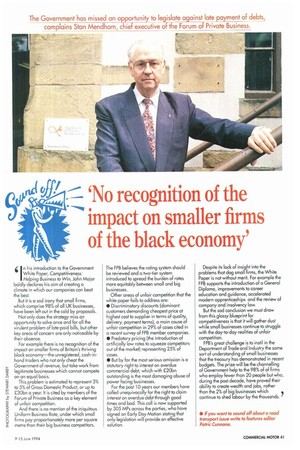'No recognition of the impact on smaller firms of the black economy'
Page 45

If you've noticed an error in this article please click here to report it so we can fix it.
6 n his introduction to the Government
I White Paper, Competitiveness: Helping Business to Win, John Major boldly declares his aim of creating a climate in which our companies can beat the best.
But it is a sad irony that small firms, which comprise 98% of all UK businesses, have been left out in the cold by proposals. Not only does the strategy miss an opportunity to solve once and for all the virulent problem of late-paid bills, but other key areas of concern are only noticeable by their absence.
For example there is no recognition of the impact on smaller firms of Britain's thriving black economy—the unregistered, cash-inhand traders who not only cheat the Government of revenue, but take work from legitimate businesses which cannot compete on an equal basis.
This problem is estimated to represent 3% to 5% of Gross Domestic Product, or up to £30bn a year. It is cited by members of the Forum of Private Business as a key element of unfair competition.
And there is no mention of the iniquitous Uniform Business Rate, under which small firms pay proportionately more per square metre than their big business competitors. The FPB believes the rating system should be reviewed and a iwo-tier system introduced to spread the burden of rates more equitably between small and big businesses.
Other areas of unfair competition that the white paper fails to address are: • Discriminatory discounts (dominant customers demanding cheapest price at highest cost to supplier in terms of quality, delivery, payment terms), a main cause of unfair competition in 29% of cases cited in a recent survey of FPB member companies. • Predatory pricing (the introduction of artificially low rates to squeeze competitors out of the market) representing 25% of cases.
• But by far the most serious omission is a statutory right to interest on overdue commercial debt, which with £20bn outstanding is the most damaging abuse of power facing businesses. For the past 10 years our members have called unequivocally for the right to claim interest on overdue debt through good times and bad. This call is now supported by 305 MPs across the parties, who have signed an Early Day Motion stating that only legislation will provide an effective solution. Despite its lack of insight into the problems that dog smal[firms, the White Paper is not without merit. For example the FPB supports the introduction of a General Diploma, improvements to career education and guidance, accelerated modern apprenticeships and the review of company and insolvency law. But the sad conclusion we must draw from this glossy blueprint for competitiveness is that it will gather dust while small businesses continue to struggle with the day-to-day realities of unfair competition. FPB's great challenge is to instil in the Department of Trade and Industry the same sort of understanding of small businesses that the treasury has demonstrated in recent budgets. The prize will be the channelling of Government help to the 98% of of Firms who employ fewer than 20 people but who, during the past decade, have proved their ability to create wealth and jobs, rather than the 2% of big businesses which continue to shed labour by the thousands.




























































































